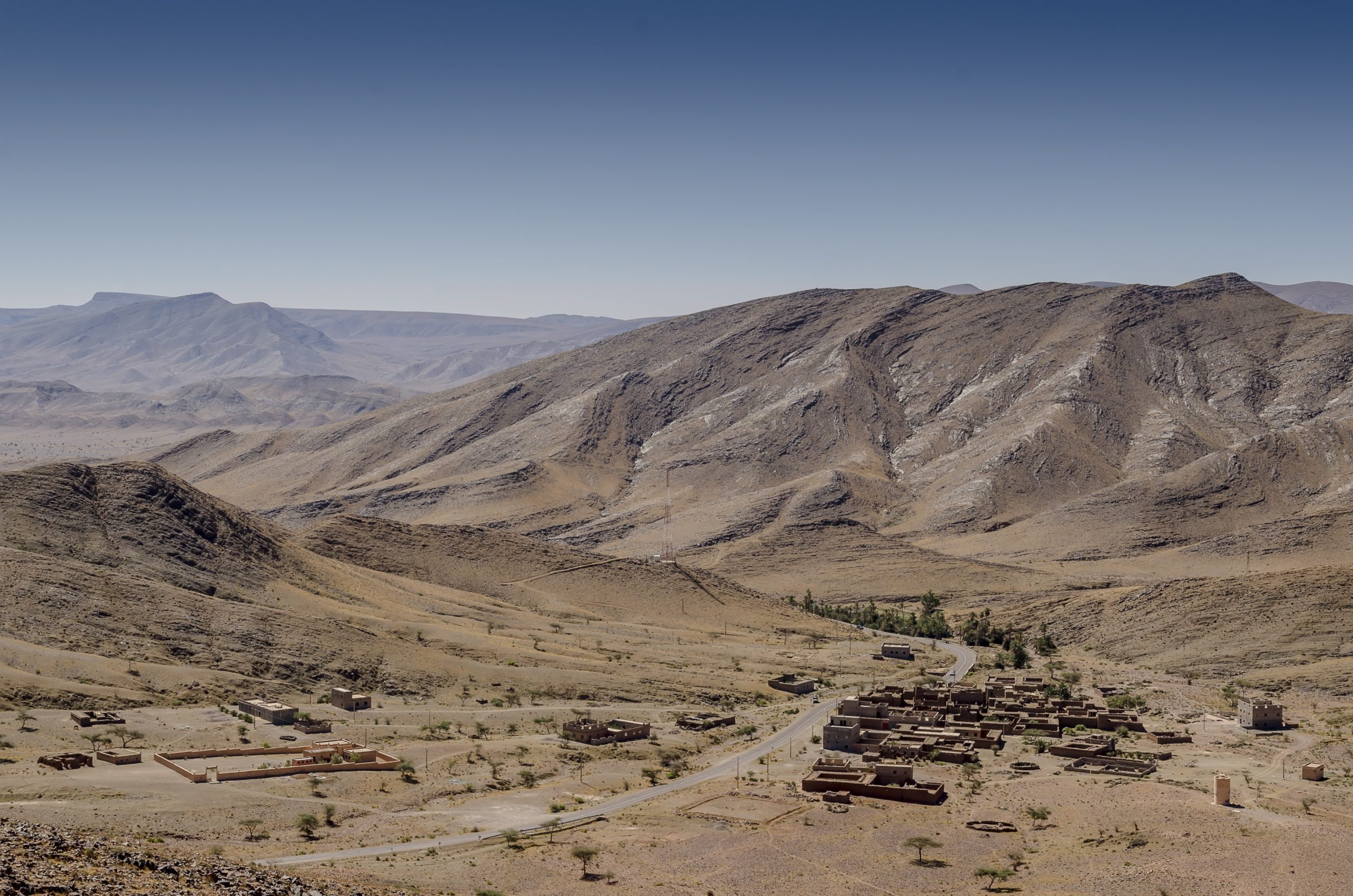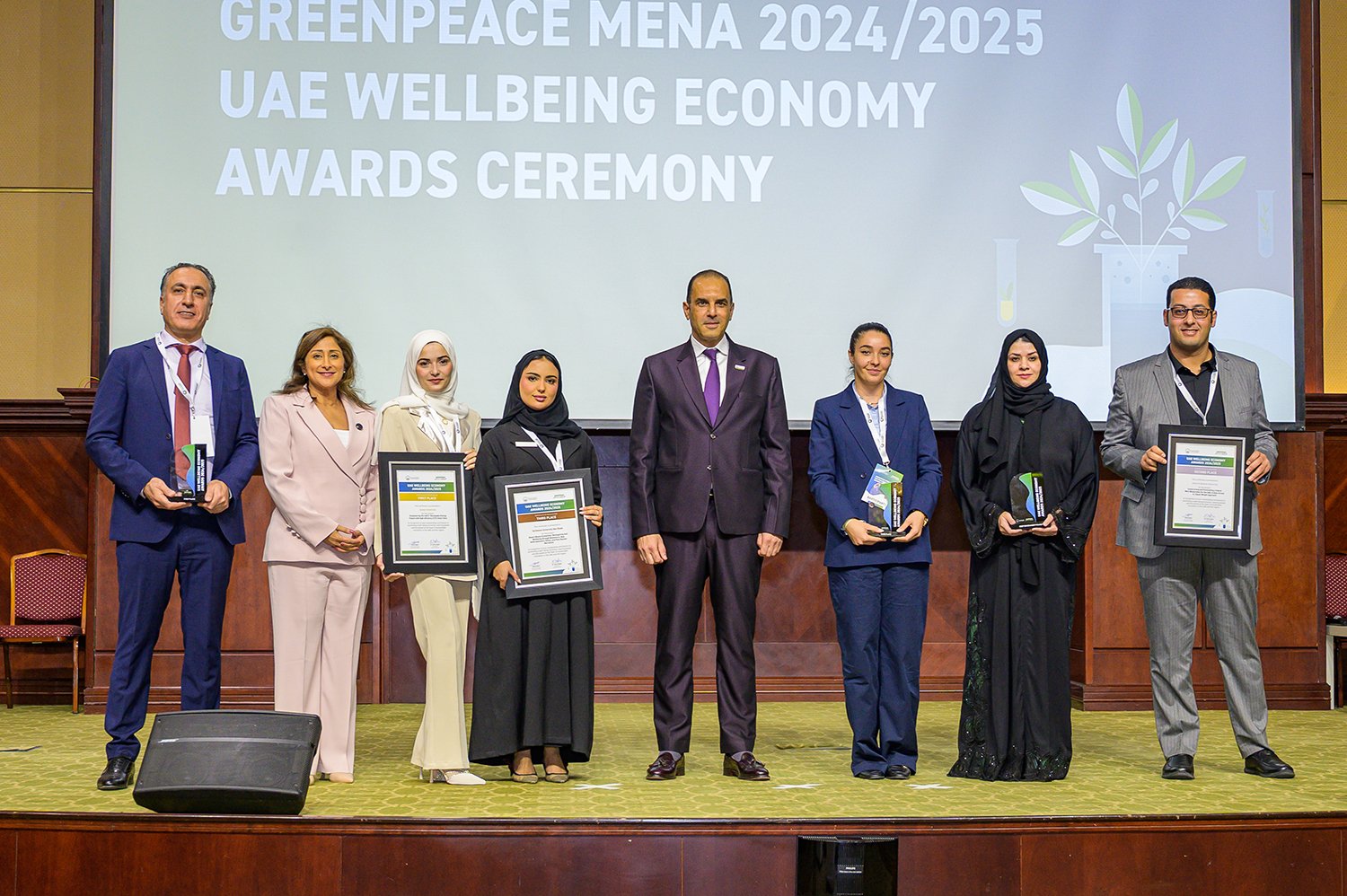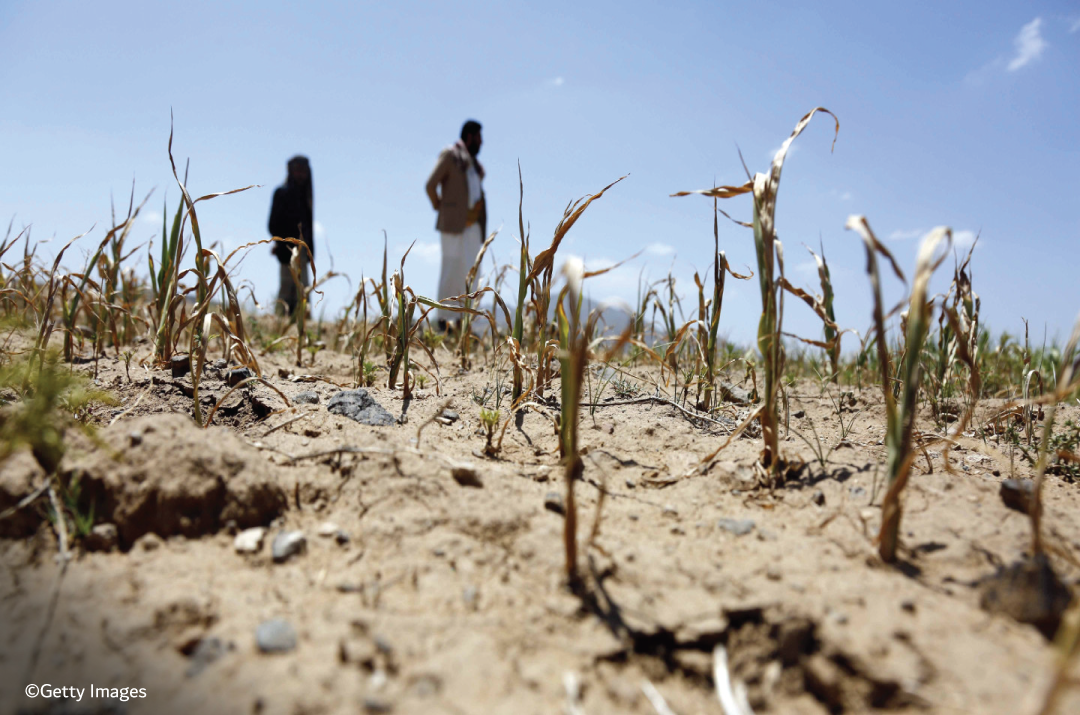Set against the lush green banks and trees of Tanzania, the third edition of the Climate Justice Camp took place from October 8 to 12, 2024, in an atmosphere filled with hope and purpose. The event brought together 300 young leaders from regions most impacted by climate change, to be part of a collective movement that aspires to make a difference. These participants from the Global South didn’t just attend passively; they were the driving force behind the camp, raising their voices to represent their affected communities and declaring, “We are here, and we are part of the solution.”
Throughout the camp, new alliances were forged, innovative projects were conceived, and participants engaged in meaningful exchanges of ideas. As such, this edition of the camp wasn’t merely a youth gathering; it became an ambitious, cross-border movement determined to effect change and tackle the toughest climate challenges. The event featured a variety of workshops, cultural exchanges, and inspiring acts of solidarity, all focused on addressing the most pressing challenges and concerns facing the world today.
Youth lead change in the face of climate change.
How Did Young People from the Global South Contribute to the Discussion on Practical and Sustainable Solutions for Climate Justice?
Young people from over 100 countries across the Global South attended the camp, including young leaders from Morocco, Egypt, Tunisia, Palestine, Jordan, Iraq, and Sudan. They arrived with their national flags held high, representing communities that are on the frontlines of the climate crisis.
At sunset on the first day, participants gathered for a group photo carrying all the symbolism of the sun. This moment marked the camp’s official launch, radiating optimism and delivering a clear message: Today’s youth are ready to lead the way toward a better climate future, united in their call for radical change.
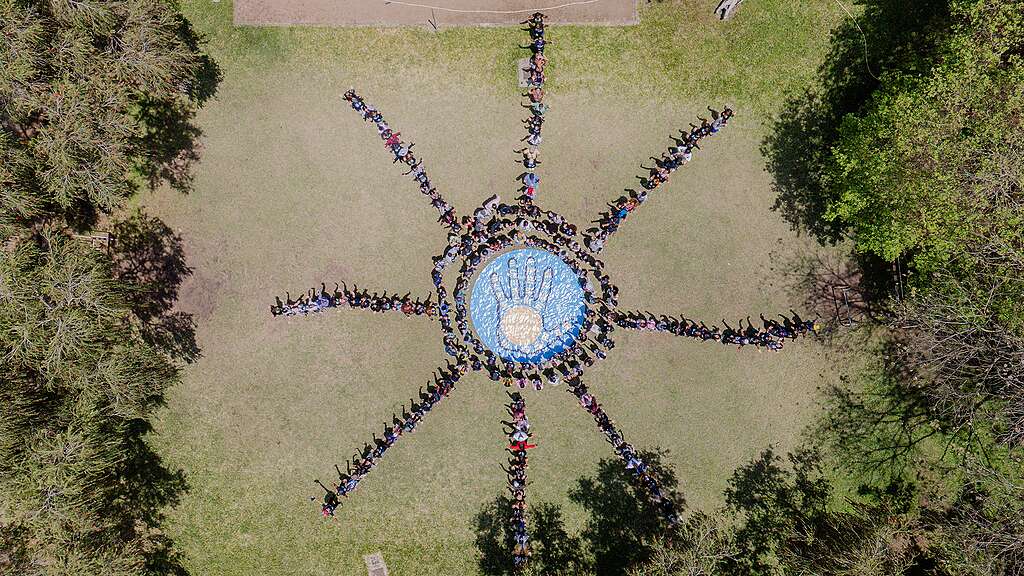
Climate Justice Camp 2024 Focus Areas: COP29 and Renewable Energy
This year’s camp participants focused on six key areas: armed conflict, COP29, the energy transition, adapting to the impact of climate change, reducing plastic pollution, and the intersection of gender and climate. They also tackled critical topics such as oil and gas projects, environmental issues, the use of herbicides, ecocide, genocide, air pollution, as well as financial mechanisms and legal strategies to make polluters pay.The youth didn’t just discuss these issues; they proposed practical and actionable solutions. Their participation in COP29 will be pivotal. They will not simply be passive observers, but leaders at the forefront, demanding their right to climate justice.
New Youth Alliances to Tackle Climate Challenges in the Middle East
At the camp, Greenpeace MENA campaigner Kenzie Azmi, alongside Ahmed Elseidi, an Egyptian environmental lawyer and founder of the Ahmed Elseidi Law Firm, led a session focused on holding polluters accountable through financial and legal mechanisms. This session gave a platform to young people representing communities that bear the greatest burden of climate change. Kenzie, along with fellow environment champions, emphasized that it’s time for polluters and large corporations to be held accountable for the damage they’ve caused. They called for the transformation of marginalized communities’ voices into a powerful force at the negotiation table.
#StopDrillingStartPaying
Skill Development and Leadership Building: An Inspiring Youth Experience at the 2024 Climate Justice Camp
For the second time, Moroccan environmental researcher Ayoub Krir took part in the Climate Justice Camp, describing his experience as “exceptional in every sense.” Reflecting on how he developed his leadership skills, he shared, “This time, I was able to participate more effectively by building on my previous experiences. Engaging with a diverse group of young leaders and environmental champions from different countries has provided me with fresh perspectives and deeper insights into my work.”
“The relationships I’ve built with my fellow participants have strengthened my sense of belonging to a larger movement striving for climate justice. This experience has been rich in learning and interaction, motivating me to continue tackling climate issues in my country and across the region,” he added.Ayoub’s involvement extended beyond discussions. He also led a workshop on combating air pollution, where he presented innovative solutions to address the “black dust” crisis in Kenitra, Morocco. Alongside the scientific workshops, participants received training on media skills, countering misinformation, and environmental photography, making the camp a valuable opportunity for young leaders to acquire practical skills essential for tackling climate challenges.
Ayoub Krir during his participation in the 2024 Climate Justice Camp
Intersectionality and Unity
A defining feature of the Climate Justice Camp was the intersection of climate justice with other critical issues, such as social justice, gender considerations, and decolonization. Despite the many challenges young people in the region face, the camp’s message was clear: We will not let obstacles silence our voices. “Perhaps the greatest outcome of the Climate Justice Camp was the restoration of hope,” said Amina Sharaf, an Egyptian researcher at the Feminist Movement for Economic, Development, and Ecological Justice in the Middle East and North Africa (MENAfem). “The principles of climate justice are inseparable from human rights and anti-colonialism, and, ultimately, feminism is deeply connected to resource exploitation and the denial of freedoms.”
She added, “While I spoke about the intersection between gender and climate change, others highlighted the links between colonialism and environmental degradation. In the face of these interconnected issues, we find ourselves calling for social unity. Building movements can sometimes feel like an overwhelming challenge, but when we stand together, there’s a glimmer of hope. At the Climate Justice Camp, we stood shoulder to shoulder, united in pursuit of a shared goal, and I found comfort in that solidarity.”
Positive Change Through Climate Justice
While attending the camp, Tunisian climate and social justice champion Aziza Fakher emphasized the positive impact the event had on youth in our region. She highlighted that participants not only gained the knowledge needed to address climate issues but also became part of a global movement challenging the destructive extractive economic model, with the goal of achieving positive and just change. By fostering collaboration among youth from the Global South, participants were able to develop comprehensive strategies to confront the effects of climate change, affirming their crucial role as leaders in this field.
Fakher stated, “The climate crisis has become an inseparable part of our struggles in the region, as our lives and the livelihoods of our communities are deeply affected by water scarcity, drought, and ineffective climate and environmental policies rooted in the capitalist system. Spaces like the Climate Justice Camp play a critical role in facilitating the exchange of knowledge and experiences among Global South communities, strengthening solidarity, and amplifying our narratives to drive climate action and contribute to building a just future.”
Lebanon’s Forced Absence Due to Aggression
The first edition of the MENA Climate Justice Camp began in Tunisia, followed by the second edition in Lebanon. However, this year, the region is facing immense challenges due to the Israeli war on Lebanon and the unfolding genocide before our very eyes in Palestine, which prevented some young people from traveling to Tanzania and participating in the camp. Despite their physical absence, their voices remained strong. Lebanese environmental champions Yara Abdel Khalek and Tala Alaa Eddine, who were unable to attend, commented, “The ongoing Israeli aggression made it impossible for us to represent our country.”
“We, like many environmental champions from Lebanon, were eager to participate in the climate justice camp, but the Israeli war on Lebanon and the region prevented us from doing so. Last year, this camp’s second edition was held in Lebanon, providing an opportunity to mobilize the power of the youth, especially from the Global South, against global challenges. The camp offered us a space to gather, exchange knowledge, promote climate action, and build regional networks. The topics of decolonization and ending occupation have been central to our discussions and our approach to achieving climate justice in the region. This year, the occupation and the wars it’s provoking in the region have directly prevented us from participating, silencing our voices, marginalizing us as young people, and isolating us from global climate discussions,” they added.
“The ongoing Israeli occupation, backed by major powers in the Global North, is directly responsible for what we are witnessing today in Lebanon and Palestine, and what the region has suffered since 1948. This highlights the urgent need to address not only environmental crises but also the broader systems of violence and oppression that fuel them. The climate crisis is exacerbated by military activities and colonial practices that destroy our people, extract resources, confiscate land, displace communities, and deepen injustice in our region. Therefore, climate justice cannot be achieved without dismantling colonialism and ending occupation and militarization,” they continued.
They concluded by saying, “Although we are forcibly absent this year, our voices resonate through the participation of our colleagues. Let this camp, which unites youth from across the Global South, serve as a call for solidarity in climate action and resistance to the colonial powers and regimes that worsen environmental degradation and human suffering. We must name these actions and their perpetrators, decolonize our minds, and resist together to liberate both our thoughts and our land, so we may achieve true climate justice.”
The camp included moving expressions of solidarity, with speeches and events supporting both Lebanon and Palestine. Although representatives from these countries were absent, their voices were amplified by those present, who stood by them during these difficult times.
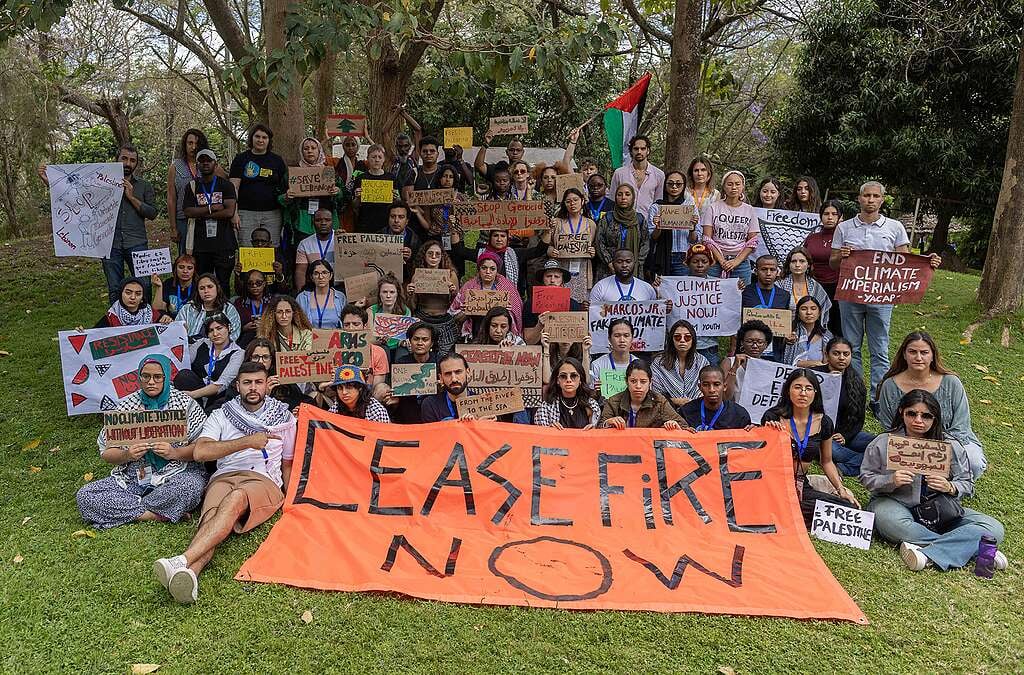
The camp was not only a space for serious discussions but also a platform for creativity and joy. In one session, participants came together to create African masks and dance to traditional rhythms, sharing moments of joy and learning about new cultures. These moments affirmed that resistance is not solely political; it can also be expressed through art and creativity, as young people use their talents to express themselves and strengthen their bonds.
Culture and Harmony
The camp was a vibrant display of collective creativity set against the backdrop of enchanting natural surroundings. The range of activities was impressive – from morning walks through forests to explore their unique biodiversity, to creating banners in solidarity with Palestine. The camp also hosted a local initiatives exhibition, showcasing sustainable projects from communities on the frontlines of climate change.
The closing ceremony celebrated the rich cultural diversity that brought together youth from across the globe. With traditional music, dances, and a shared sense of hope and optimism, the camp concluded in a strong spirit, affirming that climate justice is a common cause that transcends borders and cultures.
Arab Youth and Participation in COP29 and their Vital Role in Climate Justice
The Road to Brazil and COP29
At the end of the camp, it was announced that the fourth edition of the Climate Justice Camp will take place in Brazil next year! This is not just an invitation to participate but a clear message that this movement is growing, with youth from around the world becoming stronger and more united. As COP29 approaches, the voices of these young leaders will be the driving force behind meaningful change in global climate policies.
Participants left the camp with powerful messages and newly formed alliances, which will shape the discussions at COP29, where youth will take center stage. Through local projects, art, and cross-border collaboration, this generation is ready to tackle the greatest climate challenges of our time and push for real solutions.

Join us at 2025 Climate Justice Camp in Brazil!
With your support, we are empowering the youth to lead a sustainable future.
<strong>Donate now</strong>
